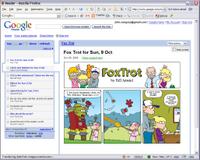
Since the beginning of time, the
Deep Cove School PAC has hosted a Christmas Fair to raise funds, and this year my dear wife volunteered to manage the Silent Auction event at the fair. Which meant, of course, that I "volunteered" as well.
Like any to-the-core card-carrying geek, I immediately focused on how to apply information technology to what is normally a low-tech affair. The requirements were deceptively simple: track between 200 to 300 items, label 'em for display at the auction, and record the winning bidders for each item. This seemed ridiculously easy: set up a spreadsheet to track the items and winning bidders, and use the mail merge function of a word processor to create labels for everything. Sweet!
So as my dear wife brought in donations, I dutifully cataloged them in the spreadsheet. This was both more time-consuming and mind-numbing than I had anticipated; I have a new respect for folks that can handle hours of data entry without going mad. Even so, any time I cursed a cramped neck or aching fingers, I consoled myself with the knowledge that this effort up front would ultimately pay off. And indeed, as I generated ID labels for items and address labels for thank-you letters, the superior fire-power of IT technology over parchment-and-quill was apparent. Marvelous!
After weeks of cataloging items (and giving up more and more space in our home), it was time for the main event: the night of the Christmas Fair. As bidders filed into the room to view items, my wife and I reviewed the bid resolution strategy we had discussed several nights before. When bidding on the items closed at 7:30pm, volunteers would gather the bids (in a paper bag) for each item, find the highest bid and record it on poster paper at the front of the room. I would crank out the list of all items and paste the printout on the poster paper so that the volunteers only need record the bidder name and amount on the paper. I would also record the winning bid in my spreadsheet, so that when the room was reopened for the waiting hordes, I could quickly tell each one all of the items they had won (if any) and pass the total to the cashier beside me. Excellent!
As the evening wore on and hundreds of bidders pawed everything in sight, I began to have doubts. I was still cataloging 20 or so items that had come in at the last moment, and my wife casually informed me that we would have 30 minutes to resolve all winning bids before the hordes would stampede back into the room. Let's see, assuming the volunteers kept feeding me with data at a constant pace, 300 items in 30 minutes yields 10 items a minute, or a sustained rate of one item every 6 seconds. Eeek!
In her infinite wisdom, my dear wife drafted a large contingent of volunteers to resolve winning bids. Moving at a frantic pace, they somehow managed to find the winning bid for each item and record it on the poster paper within half an hour. Even as this effort started, it became painfully obvious that I'd have no hope of recording all the winners in the spreadsheet before the doors were opened again. I resigned myself to capturing this information at the end of the evening - the bidders would have to scan the poster paper to see if they'd won anything. Disappointment!
When the bolts were thrown back on the doors, the bidders pouring in all had the same goal: find out if they had won anything, pay for it, and get out as quickly as possible. There is no delicate way to put this: all hell broke loose. Some bidders rushed to check favourite items they had bid on, and others crowded around the poster paper, trying to find their names. Volunteers were barraged by questions from bidders, and my dear wife and I looked at each other with the same unspoken question: what do we do now? Chaos!
And yet, somehow, against all reason, the chaos assembled itself into order. Volunteers noticed that bidders were cruising the tables looking for their items, so they simply organized the paper bags (with the winning bid taped on the outside) next to the right items. One volunteer took command of the cash box, and bidders who had retrieved their items (with the paper bag as proof that they had won the item) formed a line and payed for their stuff. We matched nearly 200 items with the winning bidders in about an hour. Redemption!
All in all, a wonderfully humbling experience. At the end of the evening, we needed to note all remaining auction items and contact the winning bidders to arrange for pickup. Those of us volunteers still remaining quickly agreed on how to best accomplish this: we walked around to each item and wrote down bidder contact information using parchment and quill. Lesson noted.



